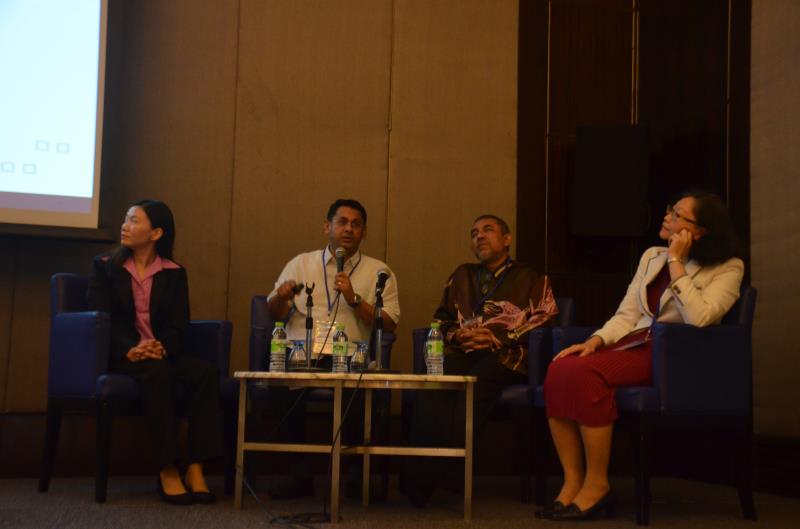 L-R: Foong Pui Hing, Dr Thirunavukarasu Rajoo, Dr Abdul Rashid and Dr Emily Tan Lay Koon.
L-R: Foong Pui Hing, Dr Thirunavukarasu Rajoo, Dr Abdul Rashid and Dr Emily Tan Lay Koon.The final workshop in the Integrated Management of Non-Communicable Diseases in Non-Governmental Establishments (iMANAGE) series focused on cardiovascular disease (CVD) management in the GP setting. Dr Emily Tan Lay Koon, a consultant cardiologist at the National Heart Institute (IJN), was the chairperson and one of the speakers.
The last workshop saw presentations by renowned cardiologist Dato’ Sri Dr Azhari Rosman, of IJN, Dr Aslannif Roslan, internal medicine specialist and cardiologist, also of IJN; and Dr Abdul Rashid Abdul Rahman, senior consultant physician and medical director, An-Nur Specialist Hospital, Bandar Baru Bangi. Also present was Foong Pui Hing, principal dietitian from IJN.
Dr Gayatri Gunasagaran, country medical lead, Pfizer Malaysia, started the ball rolling with a welcome address and the programme review and update; and finally, gave the introduction and learning objectives of the iMANAGE workshops. Tan started the first lecture on the essentials of CVD risk assessment in primary care.
Tan’s presentation was followed by a dialogue session by Dr Thirunavukarasu Rajoo, committee member of the Malaysian Medical Association. Thirunavukarasu led the dialogue, which saw the participation of Tan, Abdul Rashid, and Foong. The topic was on the implementation of lifestyle changes in CVD prevention. Here, the panel agreed it was often difficult to achieve or bring patients to target on lifestyle modifications alone. Often, a combination approach is needed to ensure they have the best outcomes.
Aslannif then took over with his lecture on effective management of CVD by virtue of making the right choices. Aslannif discussed the importance of abiding by evidence-based medicine when choosing the best treatment regimen for the patient. Aslannif said his approach to patients with hypercholesterolaemia is to start them off with high-intensity statins and bring them to target (<1.4 mmol/L). Should a more aggressive approach be warranted, he then discusses with the patient on the treatment options. Sometimes, add-on ezetimibe is warranted. For the highest risk patients, Aslannif may even consider proprotein convertase subtilisin/kexin type 9 (PCSK9) inhibitors.
Subsequently, Abdul Rashid delved into the Malaysian treatment guidelines and its practical application in the GP setting. He touched on the importance of providing optimal care and optimal therapy to patients, noting that substandard care can be detrimental to patients’ health. Quoting Muhammad Pate, in his report in The Lancet Global Health Commission 2018, Abdul Rashid said substandard care is responsible for 84 percent of cardiovascular deaths, 81 percent of vaccine-preventable diseases and 61 percent of post-birth complications. [www.thelancet.com/journals/langlo/article/PIIS2214-109X(18)30386-3/fulltext Accessed on 20 December]The final talk was delivered by Azhari, who led the workshop on shared decision-making and effective communication between healthcare practitioners and patients. He noted that it was important to spend enough time with the patient to create what is known as therapeutic relationship—one where the patient feels engaged and is empowered to improve themselves. On the physician’s part, Azhari said the doctor should acknowledge the patient’s personal view of their disease and encourage expression of worries, anxieties and concerns. Importantly, doctors must accept that patients may need support for a long time, and repeated efforts to encourage and maintain lifestyle change may be necessary for many patients.